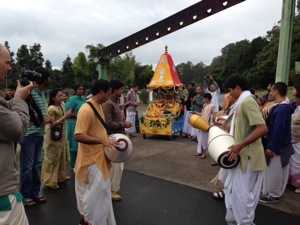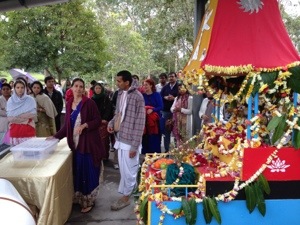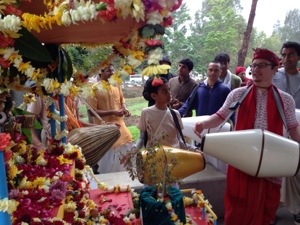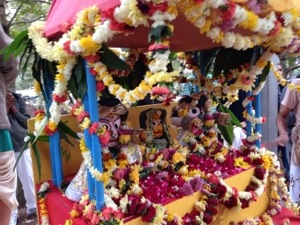Answer Summary: Real guilt comes between us and the things that take us away from Krishna, not between us and Krishna. If guilt stops or slows us in taking shelter of Krishna, then we should recognize it to be pseudo-guilt, the temptation for self-centeredness masquerading as guilt. By firmly rejecting pseudo-guilt, we can regain our devotional enthusiasm.
Answer: Just as nature has provided us an immune system that protects us physically, it has also provided us an inner immune system that protects us emotionally and spiritually. This inner self-defense mechanism is centered on our conscience, the inner voice that prods us towards the right path and away from the wrong path. By patting us when we act honorably and pinching us when we act dishonorably, it coaches us for making choices that preserve and promote our inner health. When our conscience pinches us, we feel that pinch as guilt.
No guilt?
If we don’t feel any guilt at all, then it indicates that we are afflicted by a spiritual version of AIDS; our inner immune system has been sabotaged by a serious malady – possibly the infection caused by the permissiveness, even licentiousness, of the culture around us. We need to treat our intelligence with a serious study of scriptures. This will re-educate us about universal inexorable moral and spiritual principles, thereby reviving and rejuvenating our conscience. Then guilt will start acting to protect us from wrong choices.
Guilt spurs, not deters, spiritually
To understand how guilt is meant to spur, not deter, us in devotional service, let’s explore the health metaphor further.
When we ingest something unhealthy, we start feeling physical discomfort, maybe a vomiting sensation. This discomfort is meant to serve a corrective and a preventive purpose: to spur us to correct the condition by taking medicines and to deter us from repeating that dietary mistake.
Similarly, when we do something wrong, we start feeling emotional discomfort, a guilty sensation. This guilt is meant to serve a corrective and a preventive purpose: to spur us to correct the condition by taking the medicine of the devotional remembrance of Krishna and to deter us from repeating that moral mistake.
Central to the recovery of our inner health is our clear understanding of the healing potency of Krishna consciousness. The Ishopanishad (mantra 8) declares the Absolute Truth to be shuddham (pure) and apapa-viddham (untouched by sin). Srila Prabhupada translates these respectively as antiseptic and prophylactic, thereby underscoring the therapeutic value of contact with the Absolute Truth. The medicine metaphor runs consistently through the writings of great seers ranging from the medieval saint King Kulashekhara to the modern scholar-devotee Bhaktivinoda Thakura, who proclaim poetically and repeatedly that the holy name of Krishna is the most easy and efficacious cure for all worldly contaminations. Bhaktivinoda Thakura has written many songs that express guilt and remorse. (Of course, he is an ever-liberated eternal associate of the Lord who by divine arrangement played the role of a Bengali intellectual-seeker – an avid reader and thinker who after exploring many philosophies and paths finally discovered the glory and the supremacy of Krishna’s message of love coming through Lord Chaitanya.) Through his songs, he shows us by example how we should feel guilty and repentant for our past misdeeds and present weaknesses. Significantly, his songs conclude with a fervent plea to the Lord for grace coupled with an admission of his inability to reform himself.
This thought-flow in his songs illustrates the role of guilt in spiritual recovery. Just as the discomfort caused by sickness is meant to highlight our urgent need for the medicine, the guilt caused by wrongdoings is meant to highlight our urgent need for Krishna.
The trap of pseudo-guilt
However, the forces of illusion often tempt us with a sinister misinterpretation of guilt. Instead of thinking, “I am so fallen, therefore I need Krishna desperately”, we think, “I am so fallen that I will never be able to go close to Krishna, so what is the use of practicing devotional service?”
What’s wrong with such thinking? To understand, let’s rephrase it in terms of a patient’s mentality: Instead of thinking, “I am so sick, I need the medicine desperately” the patient thinks, “I am so sick that I will never become healthy, so what is the use of taking the medicine?” Such thinking might be valid if the patient was incurable, but the scriptures stress repeatedly that we are never spiritually incurable. For example, the Bhagavad-gita (4.36) declares that whatever be our conditionings, we can go beyond them by authentic spiritual knowledge and practice. Our moral disqualification is a fact, but it is more than compensated for by Krishna’s moral qualification – he is supremely pure and supremely purifying. And more importantly, he is supremely merciful and is ready, even eager, to help us become pure.
When guilt keeps us fixated on our own impurity and doesn’t let us focus on Krishna’s purity and mercy, then what we are feeling is not guilt but temptation masquerading as guilt. After all, anything that keeps us away from Krishna and keeps us self-obsessed is a temptation – even if it doesn’t make us do anything wrong. As such pseudo-guilt discourages us in our efforts to go closer to Krishna, it definitely keeps us away from him.
Actually, pseudo-guilt soon makes us do wrong things too – if not directly, then at least indirectly. Just as the sickness of a patient who doesn’t take medicines worsens, our moral sickness worsens when we don’t take the medicine of Krishna consciousness due to the discouragement caused by pseudo-guilt. As we don’t let ourselves relish the higher happiness of remembering Krishna, our need for pleasure and the memory of lower pleasures kindled by our recent fall makes us succumb again to those very indulgences that we were repenting. Thus, pseudo-guilt first berates us for having done wrong things and then beguiles us into again doing those very things. Again and again. Such are the devious ways of pseudo-guilt!
We need to intelligently see through the guilt-trap and firmly break through it by wholeheartedly taking shelter of Krishna. No matter what our past lapses, if we practice devotional service diligently, then gradually lapses will become a thing of the past. The present though challenging will be fulfilling because we will vigorously combat and conquer temptations. And as we become increasingly purified, the future will become less challenging and more fulfilling. Till finally all temptations will disappear and Krishna will appear in our heart to welcome us to a life of pure love and eternal joy.
 While we have all become accustomed to seeing the typical images that are conjured up when we think of yoga, it can be an heart-opening experience to learn of bhakti-yoga - the yoga of love.
While we have all become accustomed to seeing the typical images that are conjured up when we think of yoga, it can be an heart-opening experience to learn of bhakti-yoga - the yoga of love. 












